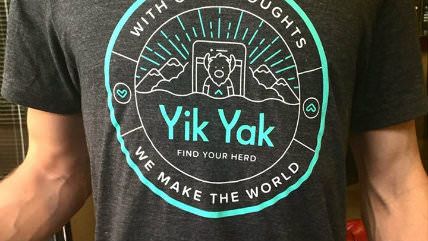Feminist Groups Say Using Social-Media App Yik Yak Without Seeing Mean Words Is a Civil Right
Someone somewhere on the Internet is mean! Call in the federal government!


Of all the bullshit, pro-censorship activism swirling about college campuses these days, this might take the proverbial cake: a group of 72 activist groups—including major women's-rights players like the Feminist Majority Foundation and the National Organization for Women and other big-name orgs, such as the Human Rights Campaign and the National LGBTQ Task Force—are asking the U.S. Department of Education to demand more monitoring and regulation of the popular app Yik Yak by college administrators.
Launched in 2013, Yik Yak is essentially anonymous Twitter with a geographical twist, allowing students to covertly post and see short comments from everyone within in a certain radius. Sometimes students complain about shared experiences, like classes or professors. Sometimes they offer one another support. Sometimes they post groan-worthy witticisms like the one to the right. And sometimes they make hateful, sexist, racist, and bigoted comments. In other words, it mirrors the diversity of speech that exists on the Internet and in the world at large.
Unlike real-world speech, however—which can be unpredictable and unavoidable—there's a very simple way to avoid exposure to content on Yik Yak: do not use the app. Do not download it. Do not log on. Problem solved!
Yik Yak is not something like Facebook, which has become a widespread norm for keeping in touch with family and old friends; nor is it like Twitter, where use might behoove young adults professionally. It is merely a live-stream of verbalized thoughts posted by anonymous individuals. It's hard to imagine that ignoring this mind-diarrhea would impact a student's life in any negative way.
Yet in their letter to the Department of Education's Office for Civil Rights (OCR), the activist groups claim that the mere existence of disparaging comments about race, sex, etc., on Yik Yak amount to violations of students' civil rights. Specifically, they allege that colleges ignoring the app are guilty of violating Title VI of the Civil Rights Act, which prevents race or ethnicity-based discrimination from institutions receiving federal funding, and Title IX, which states that "no person in the United States shall, on the basis of sex, be excluded from participation in, be denied the benefits of, or be subjected to discrimination under any education program or activity receiving federal financial assistance."
The obvious rebuttal here seems to be that Yik Yak is in no way affiliated with or sanctioned by colleges. It's an app that students can access on their personal phones, in their personal time, to view content that may or may not be posted by fellow students. Arguing that colleges are somehow responsible for monitoring and filtering this content makes no more sense than holding them responsible for all the content on local radio stations or anything any person in the vicinity posts to a personal blog. It's an unworkable and absurd standard.
However, our letter writers care not for logistics or reality.
The groups say that by "allowing" students to engage in free speech in a private, non-school-affiliated medium, campus administrators are violating federal law and students' civil rights. Never mind that students have First Amendment rights, too—I mean, come on, that was our first amendment. Aren't we over that one yet?
The letter goes on to mention some Yik Yak users threatening physical violence against specific individuals. If determined to be true threats, these sorts of things are not protected by the First Amendment, and they should be investigated by law enforcement. But by no accounts is anything resembling a majority (or even a significant minority) of content on Yik Yak of this variety. And the fact that "studies show that individuals are more likely to act injuriously when they believe they are acting anonymously," as the letter states, is irrelevant. There is no non-anonymity clause to the first amendment.
Yet as we're seeing again and again with the Office for Civil Rights, there is little limit to the expectations federal agents have for colleges to protect students from any smidgen of uncomfortable experience. With pressure from powerful activists, OCR could actually make anonymous social-media platforms like Yik Yak its next target—after all, the office has already broadened the definition of sexual harassment to include not just persistent or severe conduct but any comment related to sex or sexuality that makes anyone on campus uncomfortable. Yik Yak is really just the latest reincarnation of message-boards like CollegeConfidential.com; cut off the Yak's head and something else will only spring up to take its place. But hoping the OCR will acknowledge that—or anything else resembling a relationship to the real world—is seeming like an increasingly tall order.
Welcome to 2015, where curtailing First Amendment freedoms is seen as no big deal but expecting students to forgo using a social media platform that offends them is considered an unconscionable violation of their civil rights.


Show Comments (170)